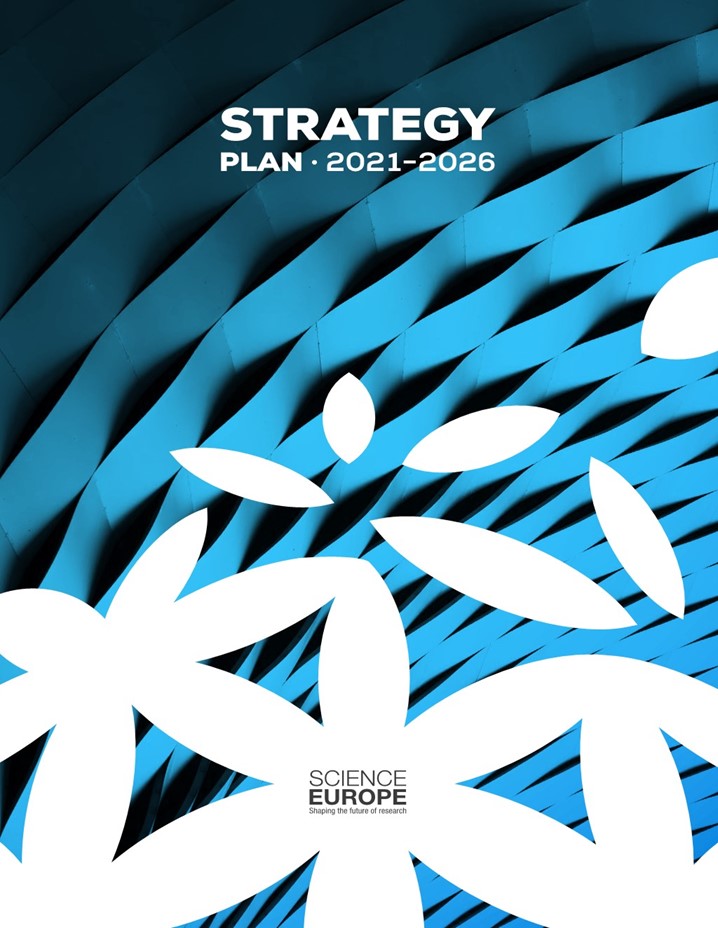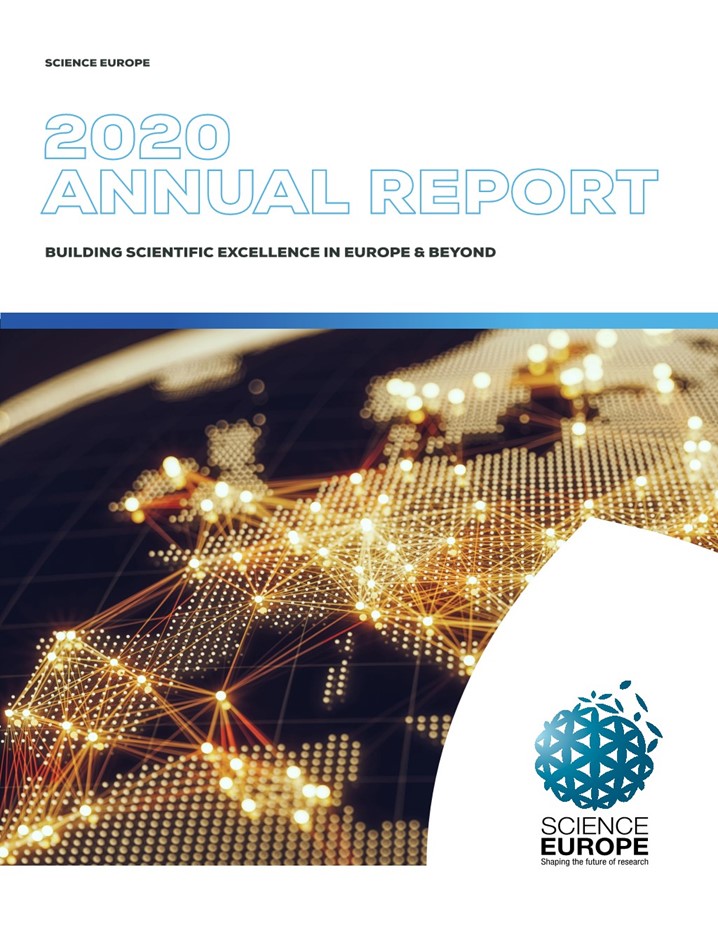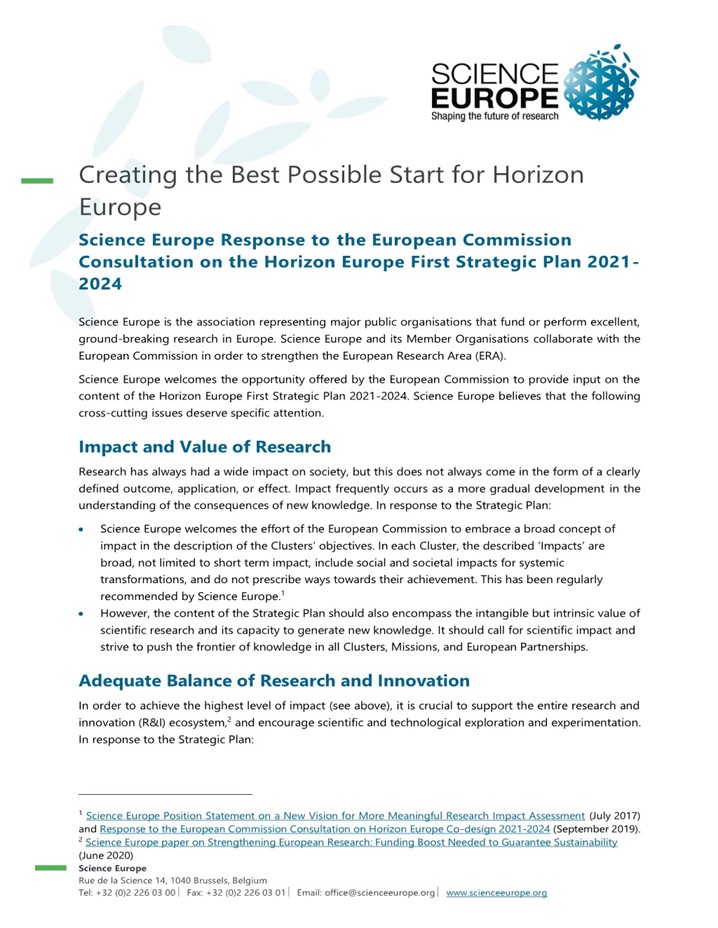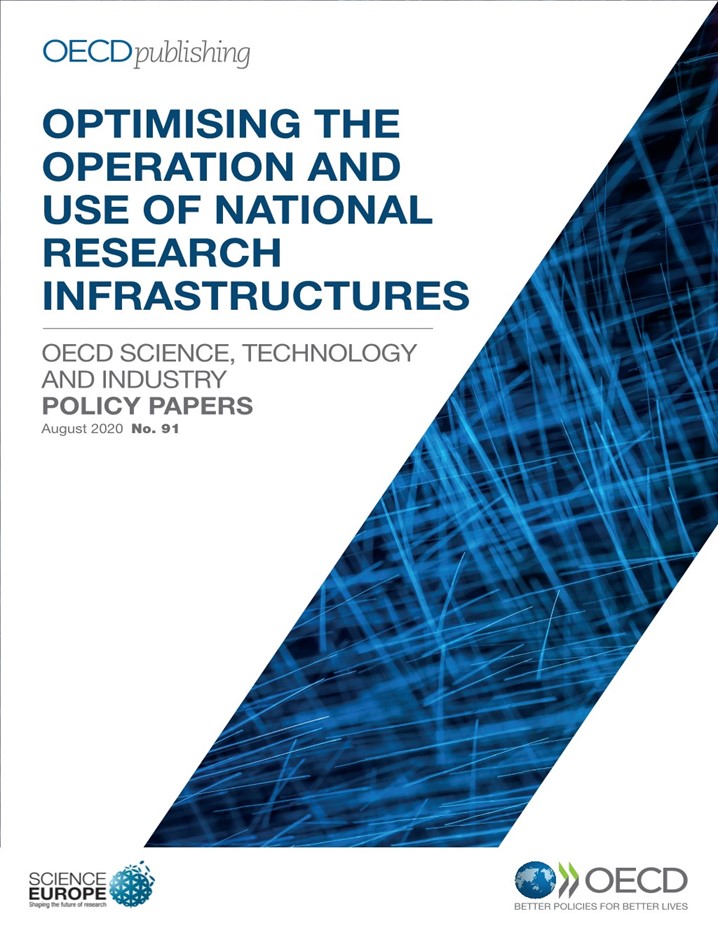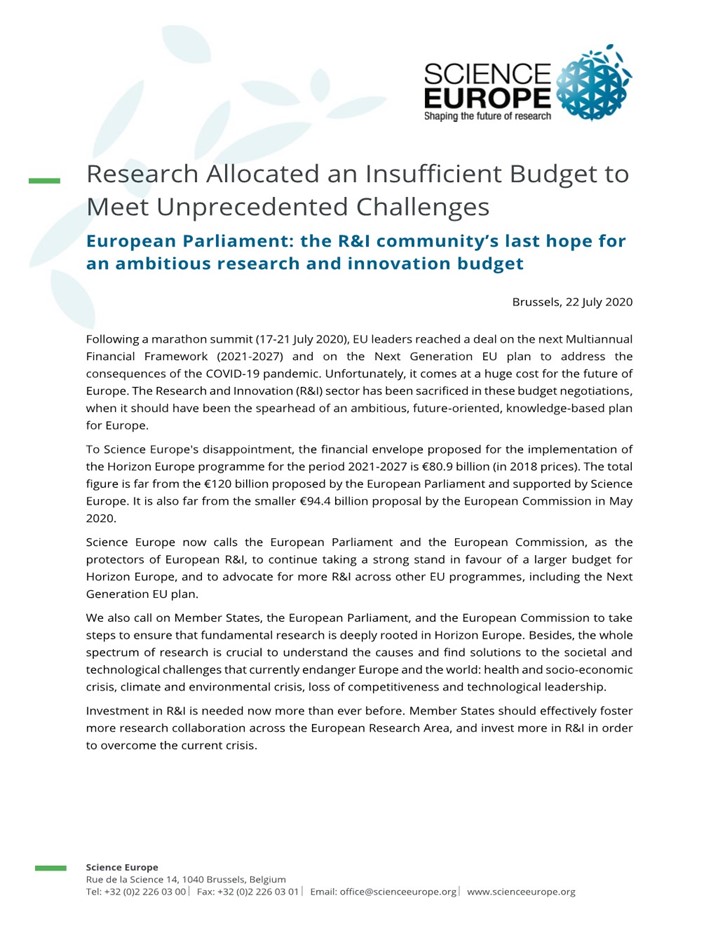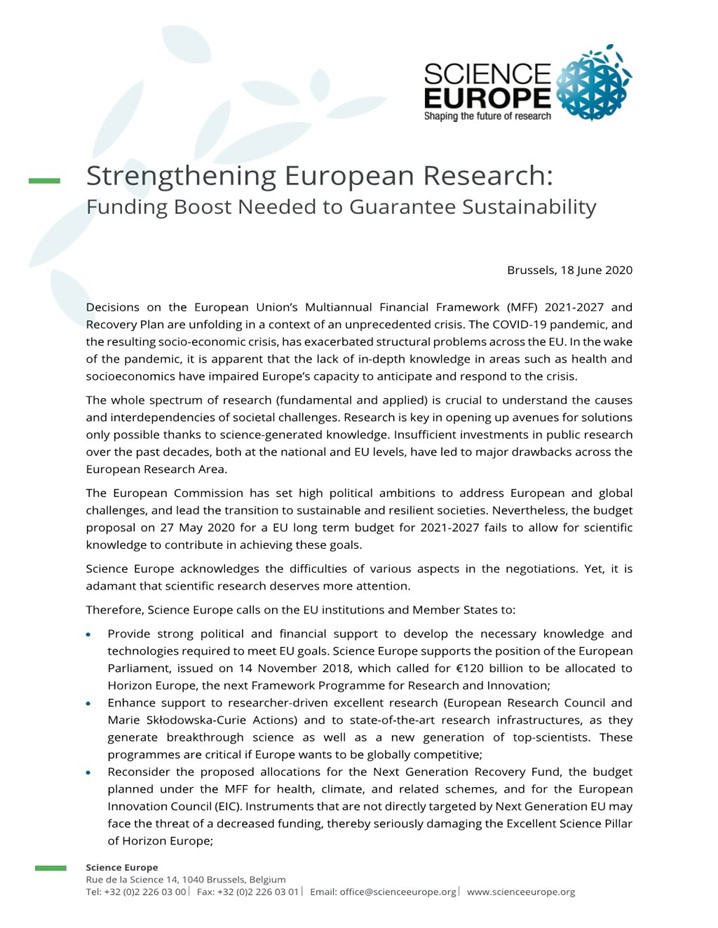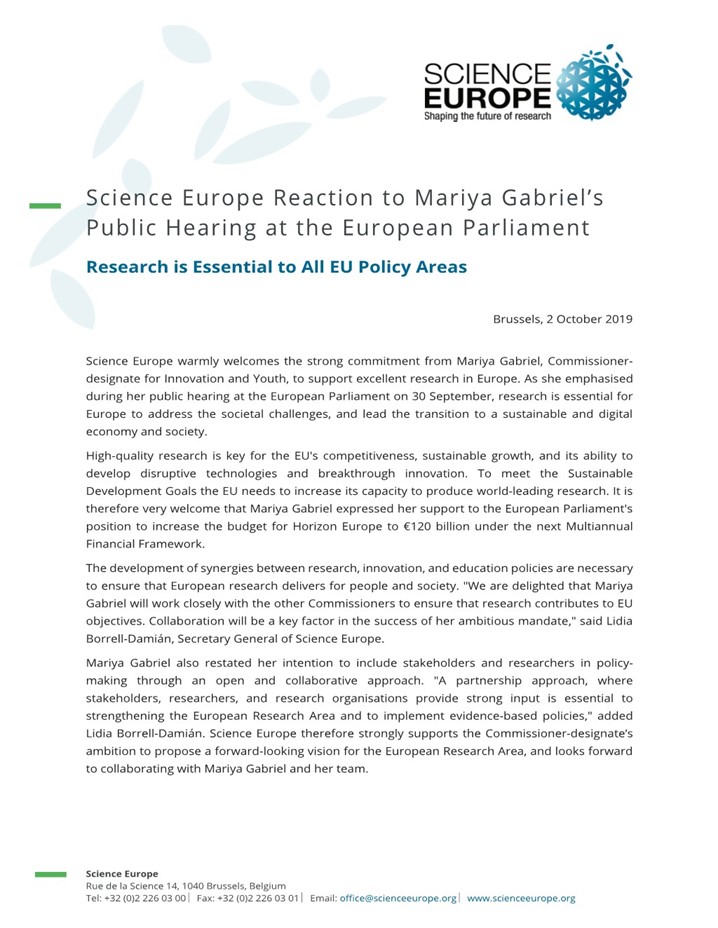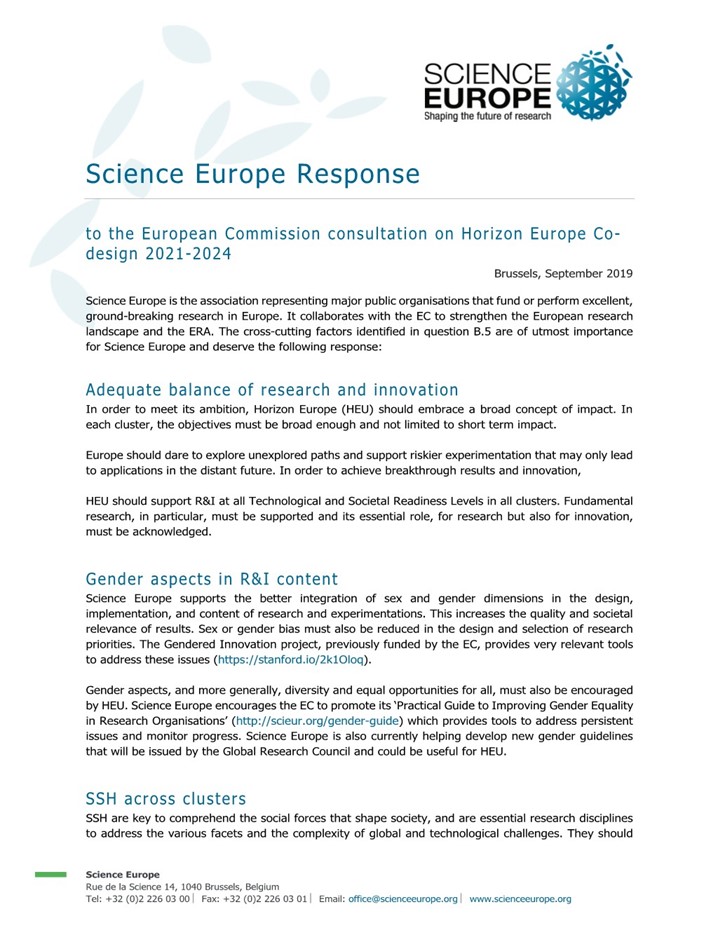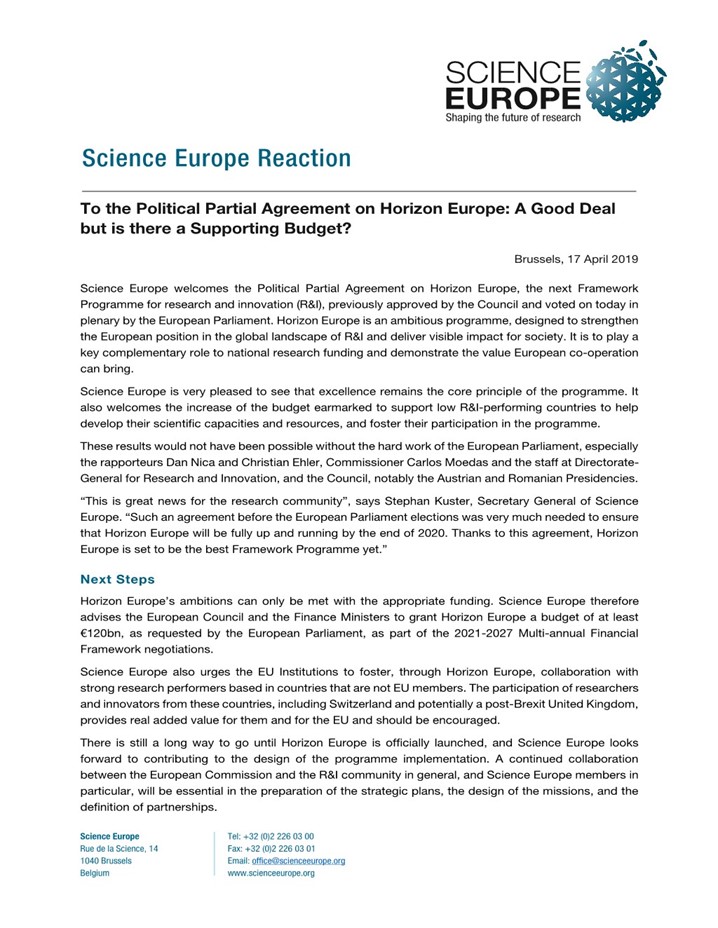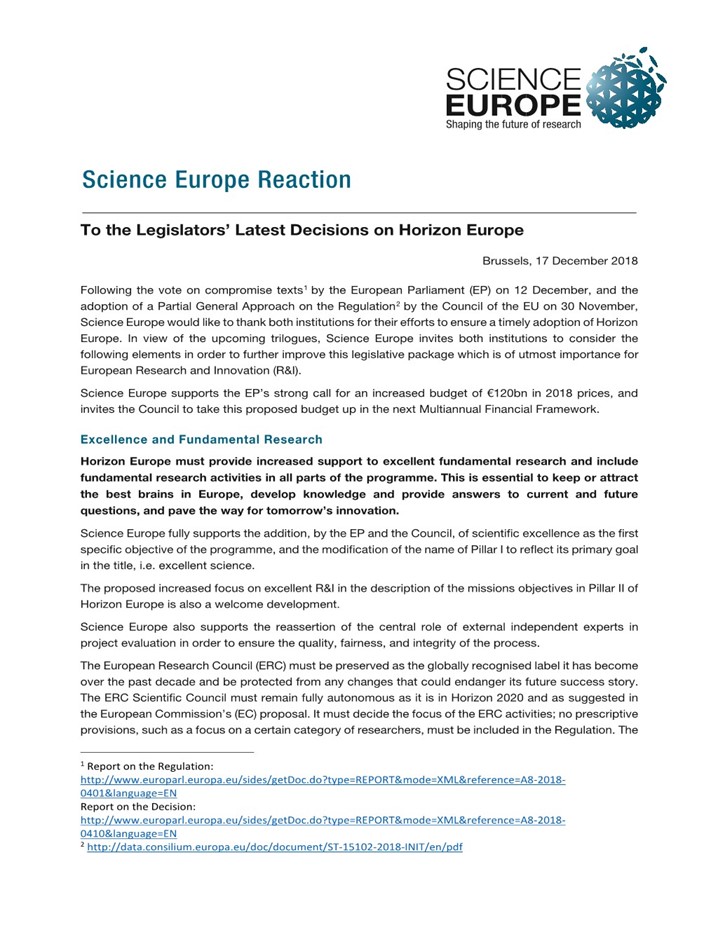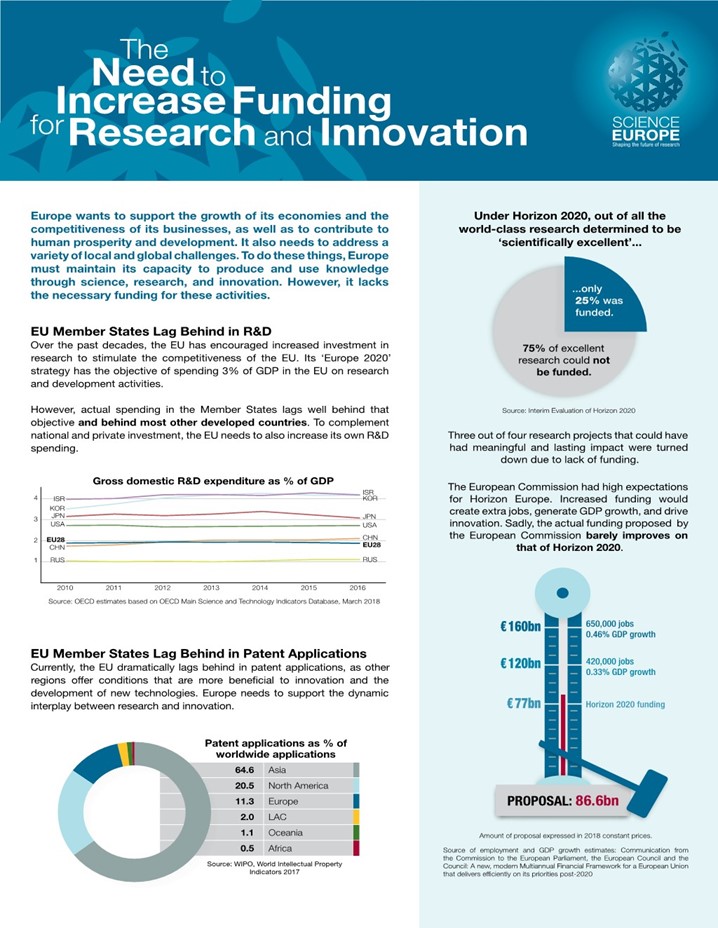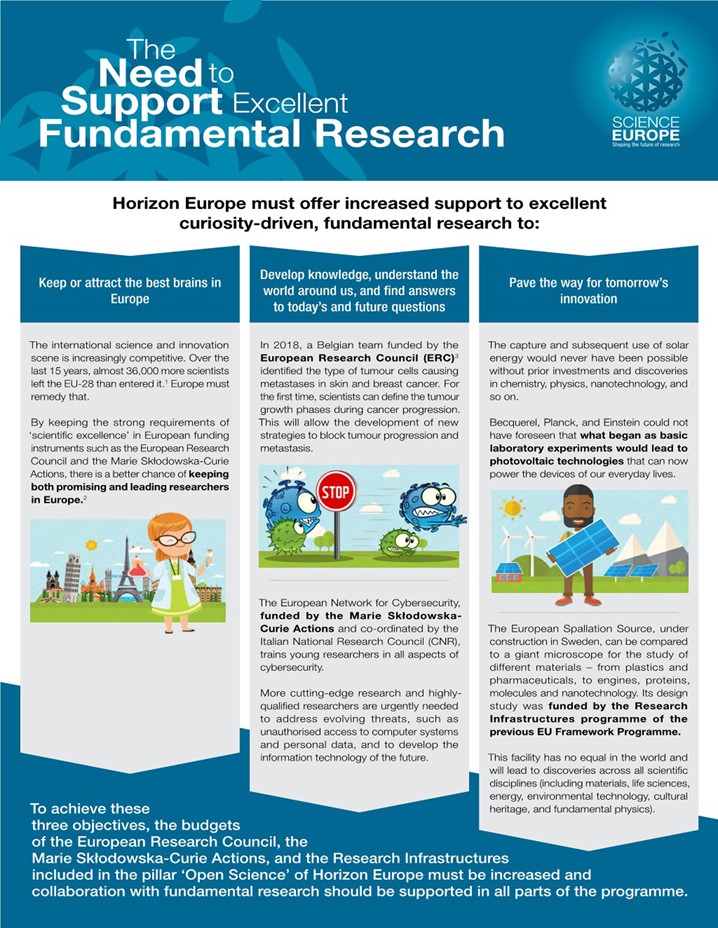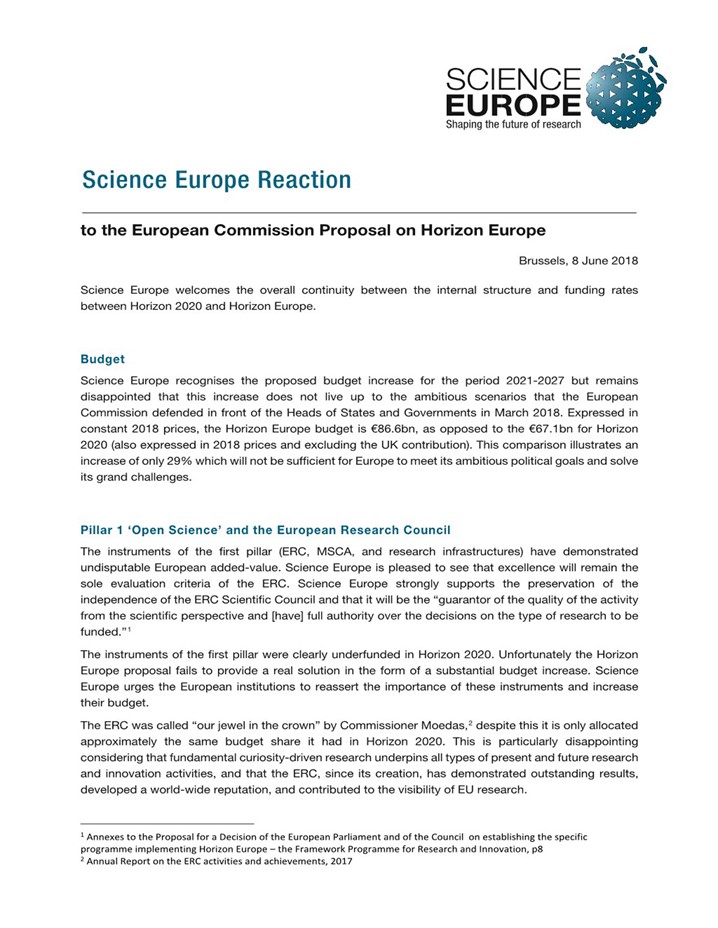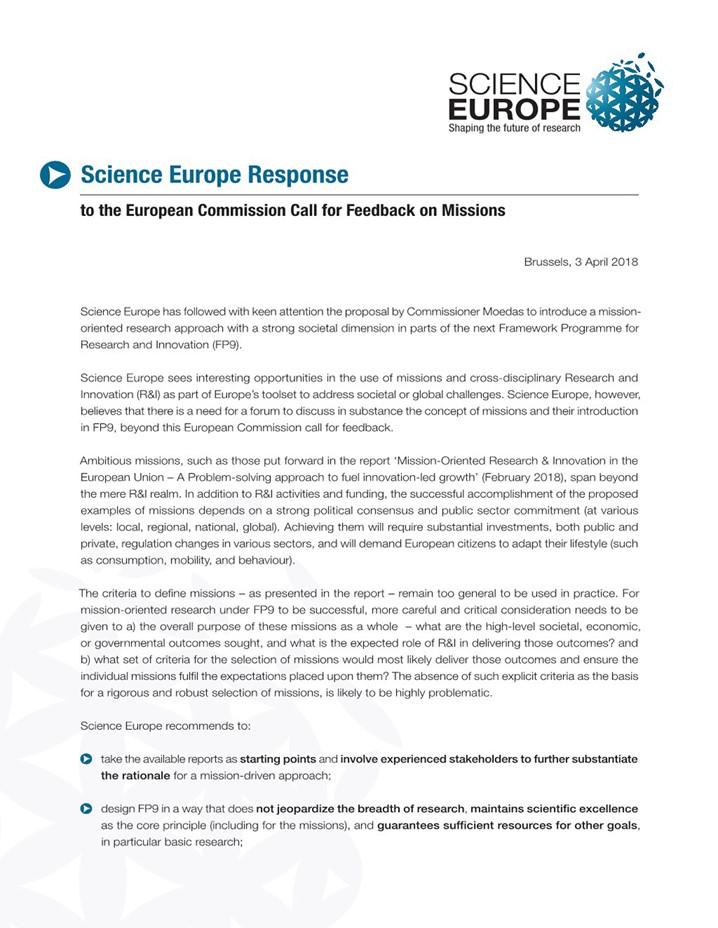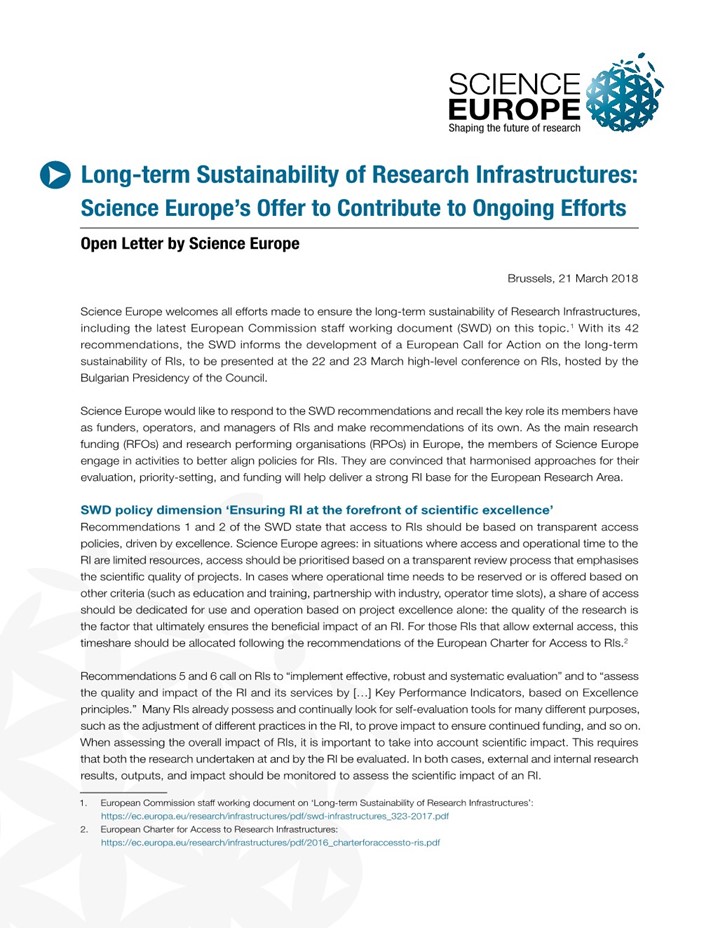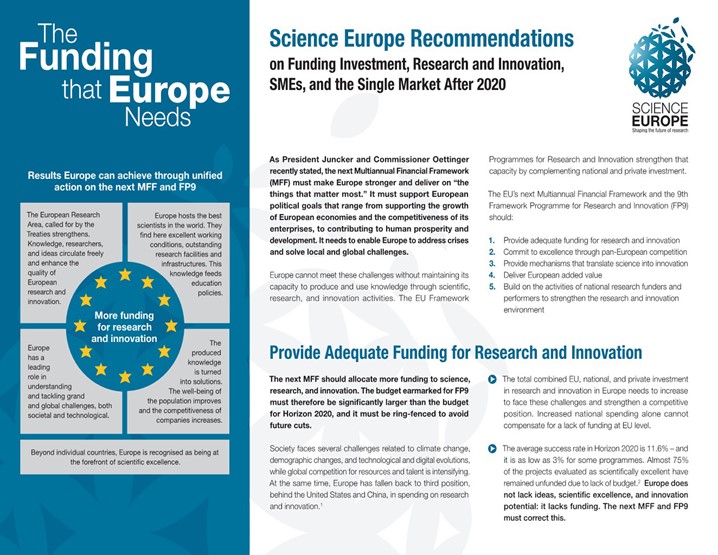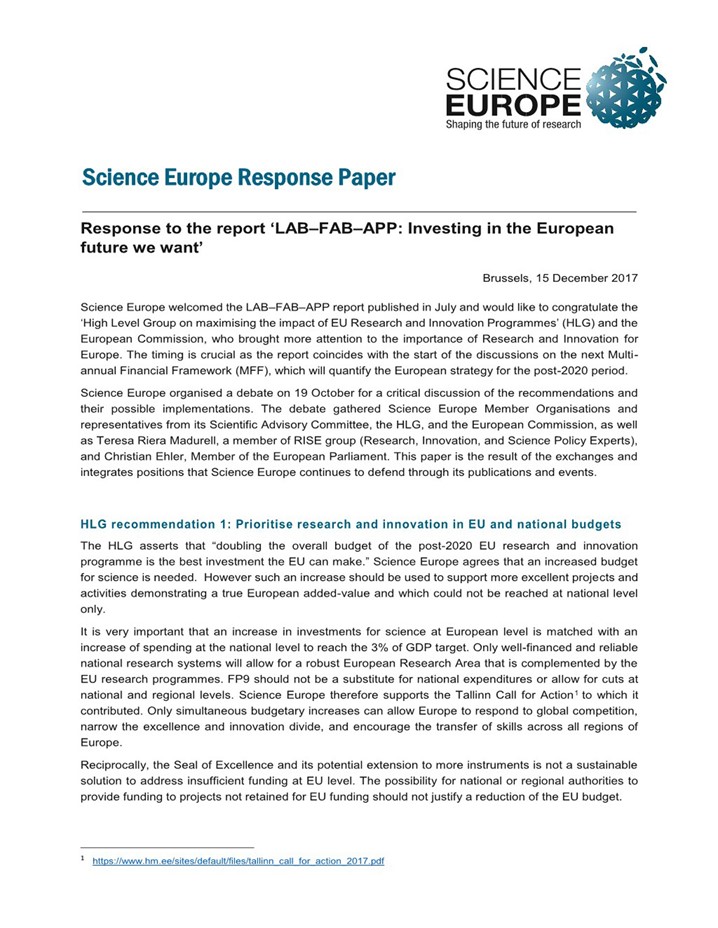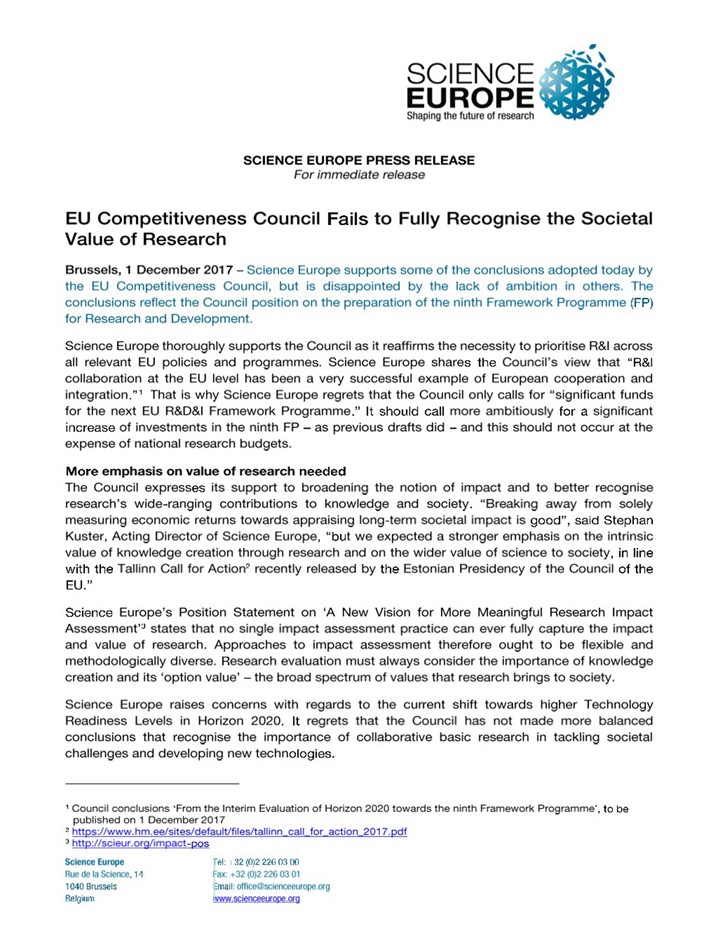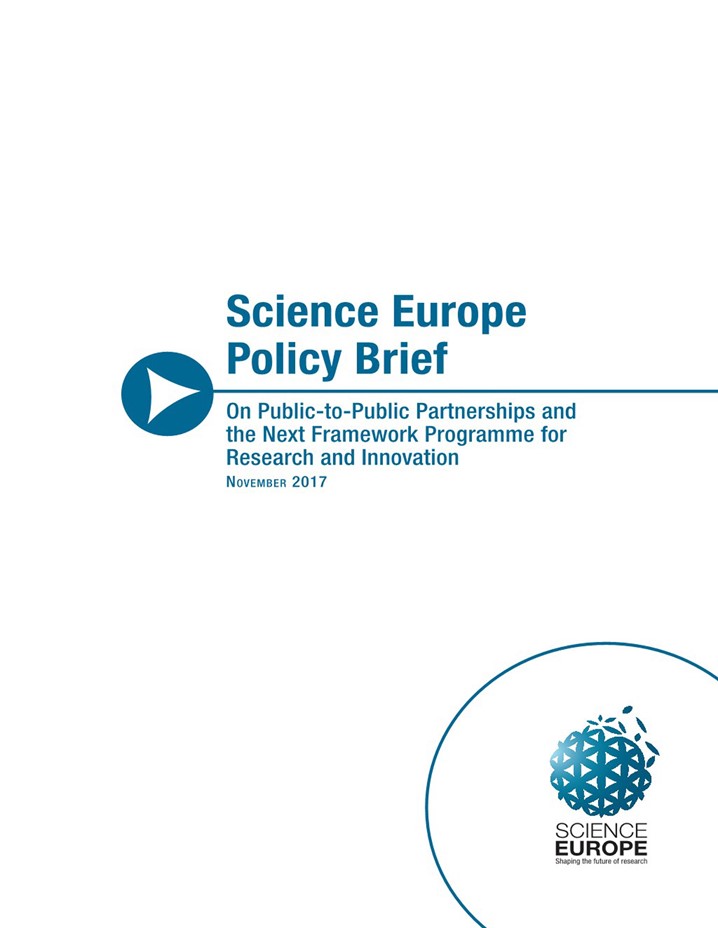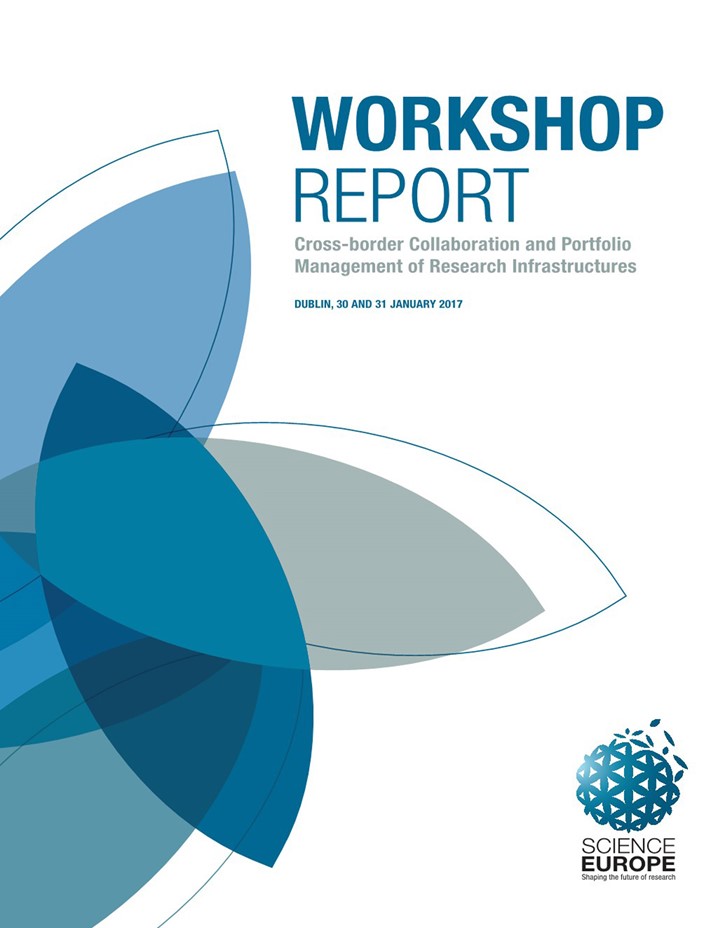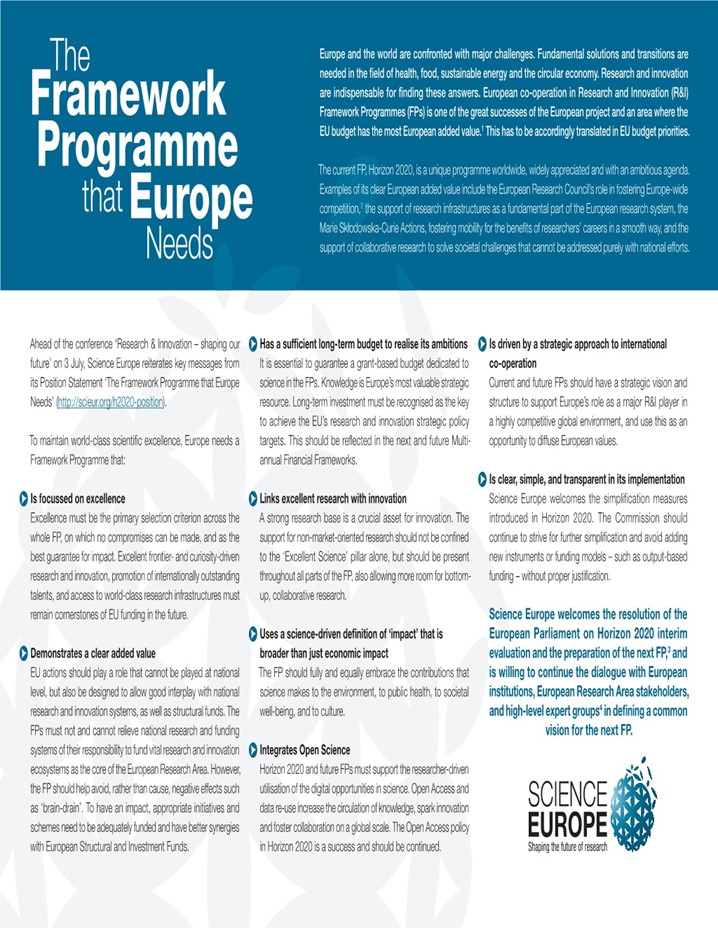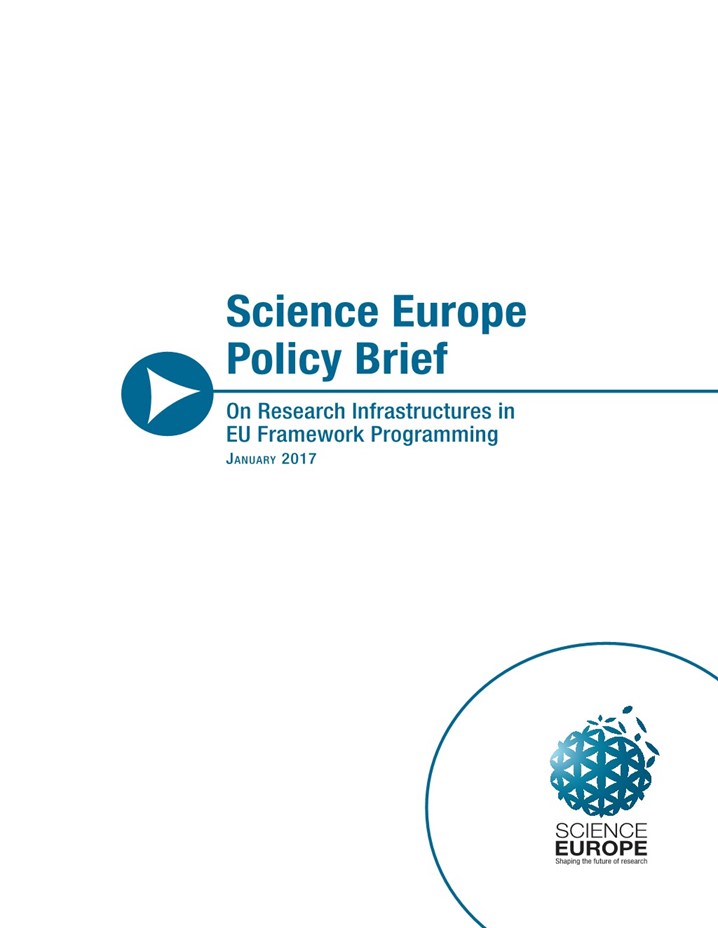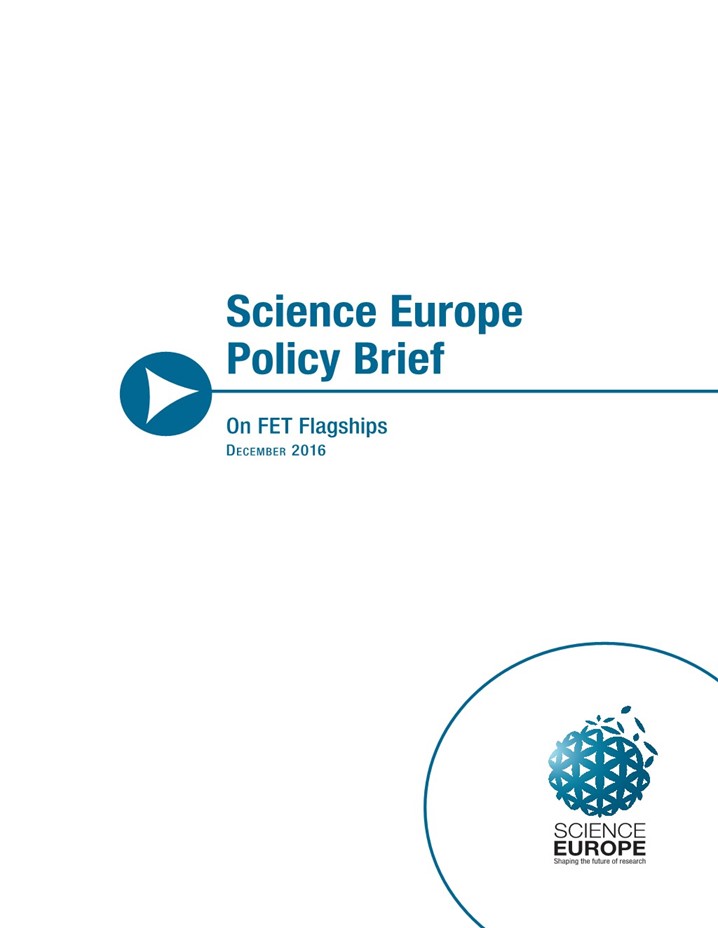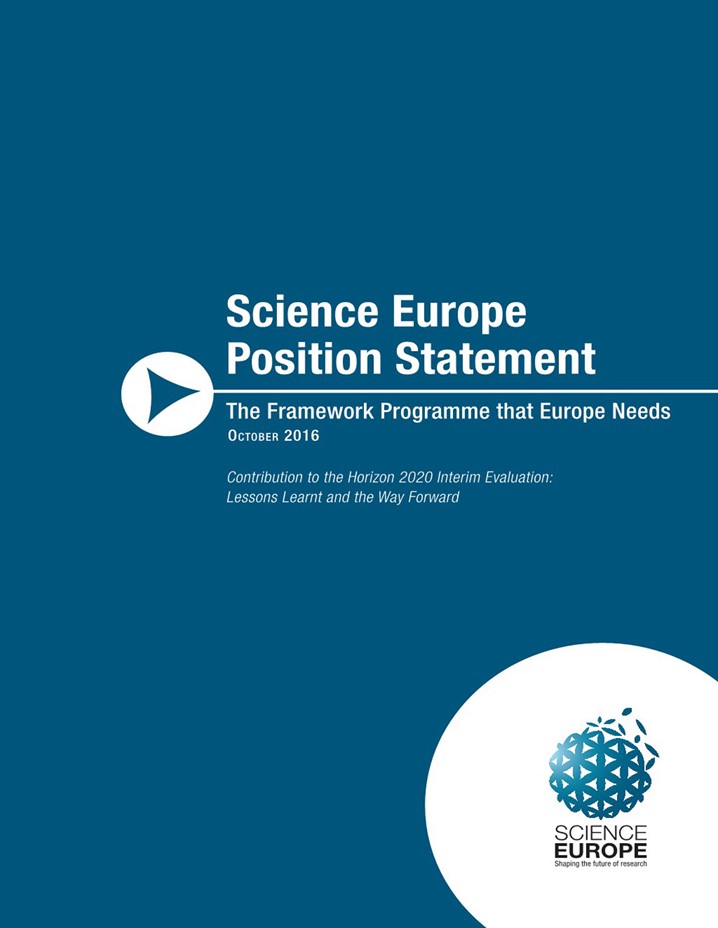Member-only content is available on this page. Please log in to view this content.

Our resources
Discover Science Europe’s comprehensive library of resources, including the most recent publications, briefings, and position statements.
59 resource(s) found
Science Europe Strategy Plan 2021-2026
The Science Europe Strategy Plan comes at a crucial time for European Research an Innovation (R&I) and includes an updated vision, mission, values, and set of strategic priorities for the association. It supports its Member Organisation in their mission to create world-class scientific knowledge, delivering more benefit for our societies.
2020 Annual Report
The year 2020 saw a global pandemic attest to the value of science. In the race for COVID-19 treatments and vaccines, Science Europe’s Member Organisations were at the forefront of the global response and our association became more relevant and important than ever.
Response to the European Commission Consultation on the Horizon Europe First Strategic Plan 2021-2024
In its response to the European Commission, Science Europe outlines numerous topics that should be further addressed in order to create the best possible start for Horizon Europe. Such developments include striking the right balance between research and innovation, embedding the whole spectrum of equality aspects, better integration of Social Sciences and Humanities, and the creation of synergies between the various parts of the programme.
SE-OECD Policy Paper on Optimising the Operation and Use of National Research Infrastructures
Science Europe and the OECD Global Science Forum teamed up to identify ways to optimise the operation and use of research infrastructures at national level.
Reaction to the European Council's Proposal for the European Budget
The Research and Innovation (R&I) sector has been sacrificed in these budget negotiations, when it should have been the spearhead of an ambitious, future-oriented, knowledge-based plan for Europe. Science Europe now calls the European Parliament and the European Commission, as the protectors of European R&I, to continue taking a strong stand in favour of a larger budget for Horizon Europe
Strengthening European Research: Funding Boost Needed to Guarantee Sustainability
Science Europe calls on the leaders of the EU to dedicate increased funding to research and innovation at the 19 June European Council meeting on the EU long-term budget and COVID-19 recovery fund.
An increased budget is necessary to meet the ambitious objectives of the European Union for a sustainable, healthy planet, and to ensure the global competitiveness of its research sector.
Science Europe also emphasises the need for sustained European leadership in tackling all COVID-19-incurred challenges.
Reaction to Mariya Gabriel’s Public Hearing at the European Parliament: Research is Essential to All EU Policy Areas
Science Europe warmly welcomes the strong commitment from Mariya Gabriel, Commissioner-designate for Innovation and Youth, to support excellent research in Europe. Research is essential for Europe to address the societal challenges, and lead the transition to a sustainable and digital economy and society.
Science Europe Call to the European Institutions: The Need for an Ambitious Budget for Horizon 2020
Ahead of the trilogue negotiations on the EU Budget for 2020, Science Europe calls on the Council to agree to a substantial budgetary increase for Horizon 2020. Outcomes of Horizon 2020 provide a key contribution to long-term economic growth, European competitiveness, and in finding solutions to societal and global challenges.
Response to the European Commission Consultation on Horizon Europe Co-design 2021-2024
For Horizon Europe’s ‘Strategic Plan’ 2021-2024, Science Europe urges the European Commission to support cutting-edge research and innovation at all Technological and Societal Readiness Levels, and to adopt objectives that are not limited to short term impact. Europe should dare to explore unexplored paths and support riskier experimentation. Moreover, Science Europe recommends to reinforce a series of cross-cutting factors to increase the scientific, economic, and societal impacts of Horizon Europe.
Reaction to the Political Partial Agreement on Horizon Europe: A Good Deal but is there a Supporting Budget?
Science Europe welcomes the Political Partial Agreement on Horizon Europe, voted on today in plenary by the European Parliament. Science Europe is very pleased to see that excellence remains the core principle of the programme. However Horizon Europe’s ambitions can only be met with the appropriate funding and we therefore advise that Horizon Europe is granted a budget of at least €120bn.
Reaction to the Legislators’ Latest Decisions on Horizon Europe
In view of the upcoming trilogues between the three European institutions, Science Europe invites all parties to consider a series of elements to further improve the legislative package for Horizon Europe. The budget of €120bn proposed by the European Parliament is a very welcome proposal and should be taken up by the Council in the next Multiannual Financial Framework. Moreover, fundamental research must be included in all parts of the programme, including the European Innovation Council.
Factsheet on the Need to Increase Funding for Research and Innovation
The overall funding for research and innovation in Europe needs to be increased and an adequate ring-fenced budget should be provided for Horizon Europe. In this factsheet Science Europe illustrates some of the reasons why.
Factsheet on the Need to Support Fundamental Research
The European Commission proposal for Horizon Europe falls short of acknowledging the importance of fundamental research. This factsheet demonstrates the essential role fundamental research plays, not only for research, but also for innovation.
Reaction to the European Commission Proposal on Horizon Europe
Science Europe welcomes the overall continuity between the internal structure and funding rates between Horizon 2020 and Horizon Europe. However, the proposed budget increase for the period 2021-2027 does not live up to the ambitious scenarios defended by the European Commission in front of the Heads of States and Governments in March 2018 and will not be sufficient for Europe to meet its ambitious political goals.
Response to the European Commission Call for Feedback on Missions
Science Europe sees interesting opportunities in the use of missions and cross-disciplinary Research and Innovation as part of Europe’s toolset to address societal or global challenges. However, the criteria for selecting missions so far have been too broad and more discussion is needed on the concept of missions and their introduction in FP9.
Long-term Sustainability of Research Infrastructures: Science Europe’s Offer to Contribute to Ongoing Efforts
Science Europe welcomes all efforts made to ensure the long-term sustainability of research infrastructures. Released prior to the high-level conference on research infrastructures by the Bulgarian Presidency of the Council, this Open Letter responds to the European Commission’s Staff Working Document on their sustainability. It makes a number of recommendations, based on the key role of Science Europe’s members as funders, operators, and managers of infrastructures.
The Funding that Europe Needs: Recommendations on the Multiannual Financial Framework
The Multiannual Financial Frameworks (MFF) determine the budget allocation of the EU over a period of seven years. Science Europe recommends strengthening science, research, and innovation by increasing their budget in the MFF for 2021–2027 and to take measures to ensure that the 9th Framework Programme for Research and Innovation will have the capacity to achieve its goals.
Response to the Report ‘LAB–FAB–APP: Investing in the European Future we want’
This is Science Europe’s response to the report ‘LAB–FAB–APP: Investing in the European Future we want’ by the High Level Group on maximising the impact of EU Research and Innovation Programmes. It outlines points of agreement, as well as additional or alternative recommendations, from Science Europe Member Organisations on how the future of European research should take shape.
EU Competitiveness Council Fails to Fully Recognise the Societal Value of Research
Science Europe supports some of the conclusions adopted today by the EU Competitiveness Council, but is disappointed by the lack of ambition in others. The conclusions reflect the Council position on the preparation of the ninth Framework Programme (FP) for Research and Development.
Policy Brief on Public-to-Public Partnerships and the Next Framework Programme for Research and Innovation
A more strategic approach is needed to the co-ordination between regional, national, and European research activities and to the initiatives supporting them. This briefing presents policy makers with the Science Europe view on how to better organise regional, national, and European research efforts.
Cross-border Collaboration and Portfolio Management of Research Infrastructures
This report explores the challenges facing research funding and performing organisations to design and manage balanced Research Infrastructure (RI) portfolios and design effective cross-border collaborations when setting up and running joint RIs. Discussions with a broad range of stakeholders took place at a dedicated workshop co-hosted by Science Foundation Ireland and the Health Research Board.
Key Principles to Shape the Future Framework Programme
Science Europe shares eight key principles to shape the future Framework Programme. Examples of its European added value include the ERC’s role in fostering Europe-wide competition, the support of Research Infrastructures as a fundamental part of the European research system, and the support of collaborative research to solve societal challenges that cannot be addressed purely with national efforts.
Policy Brief on Research Infrastructures in EU Framework Programming
Research Infrastructures (RIs) are of utmost importance for Europe’s global competitiveness and this paper puts forward the case of how the focus on RIs in Horizon 2020 should be enhanced.
Policy Brief on FET Flagships
This briefing is a contribution to the evaluation and development of Future and Emerging Technologies (FET) Flagships under Horizon 2020. It highlights lessons learned about the added value and limitations of the current FET Flagships and provides recommendations for the development of the FET Flagship instrument.
Position Statement on the Framework Programme that Europe Needs
Horizon 2020 is a unique programme worldwide; it is widely appreciated and has an ambitious agenda. It can meet expectations as long as its nature as a programme capable of supporting excellent research is reinforced. Ahead of the interim evaluation of Horizon 2020, Science Europe shares the extensive experience of its Member Organisations, many of whom have decades of experience in setting up world-leading research programmes or are among the main beneficiaries of the Framework Programmes.

